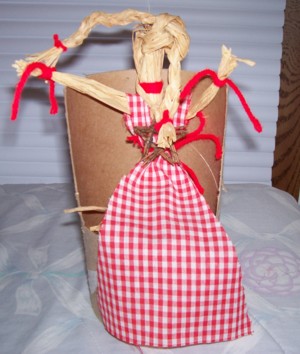![[Ivy's Pentacles]](pentlogo.jpg)
CORN DOLLY
(For Lughnasadh)

![[Ivy's Pentacles]](pentlogo.jpg)
CORN DOLLY
(For Lughnasadh)

Directions:
If you're using real wheat straw, you should get it when it is almost ripe but not totally dry yet. It should still be green at the bottom. Dry for a day, hung up, and then cut off the leaves and the head of the wheat below its first joint. When you use it it should be soaked before you try to bend it, for about half an hour. If you don't have access to the real thing, the best craft material to use is raffia, and it doesn't need to be moistened. It is easily found at the craft stores and resembles flattened straw.
There are a lot of ways to make a dolly out of the material, but here is just one easy way. First, take a large clump--maybe fifteen to twenty-five strands--and cut it so that it is about a foot and a half long. This will be the main body of the dolly. Fold it over in half. If it seems too long right now to be the size of dolly you want, you should cut it, because it is not going to get any shorter during the process. Now, where the stalks are folded is going to be the top of the dolly's head. Take the string or yarn and tie it around the entire bundle about an inch and a half down from the top; that tie will be the mark of her neck.
Before you tie off the section that makes her body, you'll need to make arms. This is easy; take more of your stalks and make a longer but thinner bundle--four to six stalks ought to do it--and fold them over. Tie off at the ends and cut the looped end so it is frayed just like the other side. The little frays represent her hands. Stick the arm bundle into the main bundle right under the neck, and then tie off the main bundle under the arms. That way they cannot slip out the bottom but can still be moved side to side or diagonally shifted.
At this point the bottom of the main bundle is frayed and splayed out a bit like a skirt. This is the simplest form of corn dolly, and it can now be considered finished if all you need is a very basic doll for your purpose. However, you can of course take a few extra steps, especially if this is to be ornamental rather than just ritually used.
You may want to make your corn dolly a dress. It is easy to cut a small piece of material--use a color or pattern that matches the season or a country print--and cut it in sort of an hourglass shape. Make a hole for the head at the center of the hourglass, and pull it over her head, then tie at the waist. The sides will be open but it doesn't much matter since it's just for effect. If you like you can even make a smaller version to make her an apron.
Also, a nice touch is giving her wheat stalk or raffia hair. Of course, for hair you can use any material, but we'll take it for granted that you are not making the dolly to be professional-looking, it is a natural craft, so it is more likely that using the same material as you used for the rest of her body will be most appropriate. For hair, take a few strands of straw and loop them again; when looped it should be as long as you want her hair to be on either side. You'll put it through the slightly closed loop made by her head. If you want this to be really easy, you may want to thread the hair piece in before tying it up, like you did with the arms. Otherwise it's still possible but you may have trouble forcing it in. In any case, thread it through the head-hole and open it up on either side, then bring it up on top of her head and tie it in a double knot. You can then leave it loose if it looks nice, or give her a braid on either side. Then it is up to you how you dress her up; some nice touches are giving her a necklace, like a twig star or a string bracelet, or you can give her a bouquet of seasonal dried flowers for her hand. Use your imagination. But it is not considered part of the traditional craft to give her a face.
The corn dolly makes a nice addition to a basket of fallen leaves or pinecones, or a wall-mounted horn of plenty with dried flowers or wheat stalks (with the heads on) protruding from behind her.
Ritual use:
This could be the same dolly used in other crafts, such as the dolly for Brigit's Bed. If that is the case, keep these other rituals and their purposes in mind as she has come to another spoke on the wheel. If this dolly was created just for this Sabbat, it can be placed on the altar during ritual and used to represent the harvest; if you have gone the simple route and not dressed it up, it is appropriate to use it as if it is the sacrifice for the harvest, and buried outside with any other libations from the ritual. It can instead be kept and hung up in the kitchen during the season and through the winter, where it can be buried or converted to a Spring symbol when the winter is past.